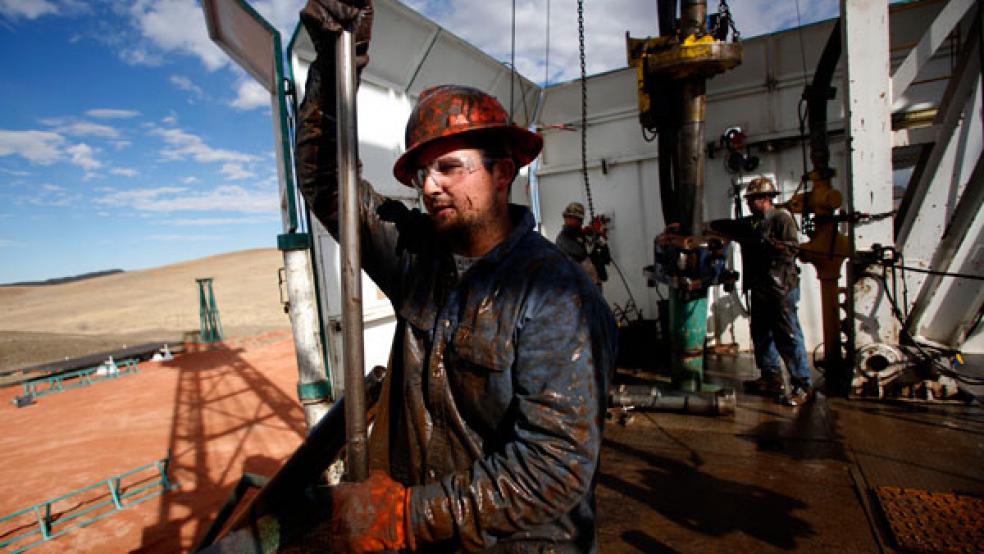It’s no secret that North Dakota’s oil industry is booming. Advancements in hydraulic fracturing have helped Western North Dakota experience month after month of record-setting oil production, making for one of the fastest-growing economic expansions the U.S. has ever seen. With the region having one of the lowest unemployment rates in the country and generating over 75,000 new jobs in the past few years, thousands of workers have showed up searching for high-paying jobs. Oil field workers in the state saw an average annual wage of $112,462 in 2012. Competition has intensified since the boom started around 2007, but entry level rig workers still average about $66,000 a year, according to Rigzone, an industry information provider and job website.
RELATED: HOW TO FIND A JOB IN THE NORTH DAKOTA OIL BOOM
Though the salary figures may sound appealing, be warned that few of these jobs are located in a cushy office environment or require a mere 40 hours a week. Most employees report working anywhere from 80 to 120 hours a week, and conditions in North Dakota can be brutal, with temperatures regularly dropping below minus 30 degrees during the long winters. Housing is difficult to find, and many workers live in man camps with shared bathrooms and dining quarters.
If you’re thinking about giving the oil industry a try despite all those warnings, what can you expect? Which jobs should you shoot for? Here’s a rundown of the highest-paying jobs in North Dakota’s oil industry. The data come from Rigzone and are averages based on total annual compensation, including overtime and incentive pay. Though the data are calculated using industry figures from around the country, we only included positions that can be found in North Dakota’s oil patch.
1. Drilling Consultant: $238,697
A drilling consultant is an expert in all types of drilling operations. To become one, you typically need a bachelor’s degree or higher in engineering or a related field and at least five to 10 years experience in the oil field. The job tends to require frequent travel.
3. Foreman or Superintendent: $182,483
Sometimes called a “company man,” this managerial/supervisor position involves overseeing day-to-day operations of a crew, including safety, budget and maintenance, and coordinating with the various contractors that work with the company. The job is largely held by senior oil and gas professionals with many years of experience.
4. Workover or Completion Driller: $151,947
A “workover” or “completion” rig is placed on a hole after it’s been drilled. It’s typically used to insert tubing or pipe into the hole, perform major maintenance operations and set up the infrastructure for a hydraulic fracturing job. It’s one of the more technically difficult jobs in the field and tends to require an engineering degree. A workover driller will also assess well performance and recommend solutions for optimizing oil production.
5. Reservoir Engineer: $149,611
There are many types of engineers in the oil field. One of the highest paid is a reservoir engineer, which involves estimating oil reserves and performing modeling studies to determine optimal locations and recovery methods. Other high-paid engineering jobs include a drilling engineer (averaging $142,664 a year), petroleum engineer ($126,448 a year) and mud engineer ($109,803 year).
6. Rig Manager: $140,560
Rig managers tend to oversee and manage the crew that’s working on-site. The job could include prepping and managing the budget and making sure targets are met. A bachelor’s degree isn’t usually required, as most rig managers start at the bottom as a rig hand or roustabout and work their way up.
7. Geoscientist or Geologist: $126,575
Geoscientists and geologists in the field study the composition, structure, process and physical aspects of the earth’s energy resources, including analyzing data and collecting samples. A bachelor’s degree or higher is required.
8. Coil Tubing Specialist: $106,976
Coil tubing refers to the metal piping used in an oil well after it’s been drilled. The tubing needed to pump fracking fluid down a well, among other operations. A coil tubing professional provides technical support and overseas the operation from start to finish, and tends to work as a contractor with many different oil companies. No bachelor’s degree is required.
9. Well Control Specialist or Well Tester: $102,868
Well control specialists or well testers typically travel from site to site, setting up and taking down rigs; inspecting production levels and equipment; and testing flowback quality. No bachelor’s degree required, though strong analytical skills, computer skills and experience with Excel spreadsheets is needed.
10. Stimulation Supervisor: $101,703
These jobs involve the work done to a well to increase production, including the process of hydraulic fracturing, when a mix of chemicals is pumped down the well to create fissures in the rock formation. It helps to have a degree in organic chemistry, chemical engineering or many years of experience working on fracking operations.
Top Reads from The Fiscal Times:
- How to Find a Job in the North Dakota Oil Boom
- The Dark Side of the North Dakota Oil Boom
- Guess Who Gets the Top State Paychecks?





